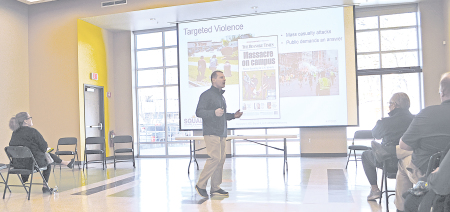Welcoming A New Series To The Evening Sun, Parking Space: A Love Story!
Published:
December 4th, 2020
By:
Shelly Reuben
 Shelly Reuben
Shelly Reuben
Shelly Reuben’s new novel is about … well, we’ll let you find out for yourself as we weekly serialize the chapters. If you miss one, get back up to speed with our article archive. Now, welcome to: Parking Space: A Love Story!
Chapter 1 - Introduction
Although it is unusual for objects to fall in love with people, it is not unheard of.
In 1950, two bank robbers in Cranford, Illinois, after shooting a pretty young teller during a hold-up, escaped with over five thousand dollars in ten dollar bills. Earlier that day, they had stolen a 1948 blue Plymouth coupe from the curb in front of a private home on Maple Street, and then parked it outside the bank, leaving their wheelman in the driver’s seat.
The robbers did not know at the time that the car belonged to the Pepper family or that Millicent Pepper was the bank teller they had shot. They did not know that since her father’s heart attack, Millicent was the only family member who drove the Plymouth, or that Mr. Pepper, an automobile mechanic, had taught her how to clean its spark plugs, patch its tires, change its oil, flush its radiator, and polish its fenders until they shone like dewdrops in the sun.
Nor, evidence notwithstanding, could they ever make themselves believe that the blue Plymouth coupe—“it’s a car, for God’s sake…just a damn car!”—had a will of its own.
And so, after fleeing the bank, jumping into the back seat, and shouting at their getaway driver to “Go! Go! Go!” they were unprepared for what happened next.
The Plymouth shot ferociously into the street.
The driver turned the steering wheel to go west.
The Plymouth spun into a one-eighty degree turn, and instead of going west, drove two-and-a-half blocks east. Then, as if it were prehistoric carnivore vomiting an indigestible meal, it disgorged its inhabitants on the sidewalk in front of the Cranford Municipal Police Station.
In a rage of recriminations after their arrest, the two bank robbers accused their getaway driver of “deliberately sabotaging our escape,” while he protested vehemently that their foiled flight was not his fault but the car’s, because it “went where it wanted to go!”
Hardly credible.
Except to Millicent Pepper, the wounded bank teller, who was certain that it was true.
Six months after she was shot, Millicent recovered the use of her arm. One month after that, she married Homer Hambling, vice president of the bank. At the reception after the wedding, her arm was so well mended that she was able to do a wind-up pitch worthy of Sandy Koufax and toss her wedding bouquet to a gaggle of giggling bridesmaids.
Millicent and Homer Hambling had a happy marriage that produced three hard-working and affectionate children. Over the years, skepticism increased about the events that had followed the bank robbery. Millicent, however, continued to maintain (she is 90 years old and still works at the bank) that as soon as the blue Plymouth realized it was being hijacked by the men who had shot her, it wrested control from the driver and foiled the bank robbers’ plans.
Why?
Because the car was in love with her. Of course.
The second story I will tell you about what can happen when an inanimate object falls in love involved no threat to life or limb and no criminal consequences.
It began on August 16, 1914, the day that Stanley Farnum’s father gave him a Zinn Beck Model 400 baseball bat for his fourteenth birthday.
Stanley loved his dad, loved his bat, loved baseball, and wanted nothing more than to play the game for the rest of his life. He was good at it, too, and when he was just eighteen, he was drafted to play for a major league American baseball team.
Over the next twenty-five years, Stanley participated in six World Series, led his league in home runs four times, and was still going strong at age 43 when his Zinn Beck bat, which had never failed him, split down the middle, signaling the end of his winning streak and the beginning of the end of his career.
Parenthetically, during all of those years, no ball players other than Stanley was ever able to use his bat, having learned that as soon as their fingers touched the grip, they received an electric shock similar to a 30,000 volt discharge from a stun gun.
I could tell you many more tales of inanimate objects and the emotional bonds they form with humans, but I’m eager to get on with my main story, so I’ll end with Lemuel Hobday, whose brilliant career as a paper decoupage artist spanned seventy years.
Using the tools of his trade, Hobday fashioned intricate branches on blossoming cherry trees…butterflies with delicate, translucent wings…lace curtains so wispy, they seems to be fluttering in a breeze…and skylines so evocative you could almost hear a din of screeching brakes and honking cars.
But his favorite subjects were fairytales.
In the scenarios he sculpted, imperiled princesses with flowing tresses broke the hearts of grieving kings. Courageous knights climbed Ice Mountains. Magic carpets flew over minarets. Giant genies ascended from magic lamps. Princes became imprisoned by witches’ spells. And all were done with imagination, charm, and the sensitivity of a poet or a saint. So successful was Lemuel Hobday that his works have been shown in museums everywhere from North America to the Far East.
The tools with which Lemuel created each masterpiece, however, were spare. Merely blank sheets of paper and one very small, very sharp pair of scissors.
A pair of scissors which—I’m sure you have already anticipated this—dearly loved their master.
After Lemuel Hobday died at age ninety-five (while cutting a decoupage of Thumbelina) his will specified that his precious scissors were to go to the Cooper-Hewitt Museum of Design on 91st Street in New York City. However, on the day the museum’s curator came to pick them up, his fingers barely touched the metal surface of their inheritance when instantly—preternaturally—the scissors dissolved into an amorphous pile of rust.
Like the Grandfather’s clock (the one that was too big for the shelf), that exquisite pair of scissors “stopped short never to go again” when old Lemuel Hobnay died.
Copyright © Shelly Reuben, 2020. Shelly Reuben’s books have been nominated for Edgar, Prometheus, and Falcon awards. For more about her writing, visit www.shellyreuben.com
Author: Shelly Reuben - More From This Author
Comments








